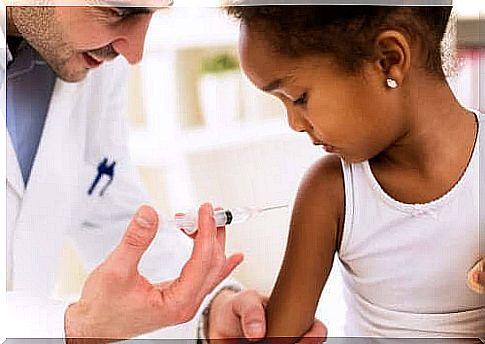What Is The Antivaccine Movement About?

Furthermore, there is no scientific evidence against vaccines. Children and individuals with a weakened immune system are the part of the population most at risk. Read about the antivaccine movement here and why it is dangerous.
How did the antivaccine movement come about?
The antivaccine movement can be defined as a group of people who are against vaccination. They believe that the health risks involved in vaccines or the very act of vaccinating outweigh the benefits. The reasons for their belief in vaccines can be religious, political, philosophical or hygienic.
The origins of the first vaccines can be dated back to the year 1796. This year, Edward Jenner, an English physician from the country, described the ability to prevent the spread of smallpox. How? By putting healthy individuals in contact with the plaster from the wounds of sick individuals with smallpox.
At the same moment, the first skepticism about vaccines arose, even among the medical community. From that time until today, there are many countries that have suffered from outbreaks of preventable diseases as a result of the influence of people who are against vaccines.
One of the most well-known articles from the antivaccine movement is the one published in 1998 in The Lancet. The article in the scientific journal associated the vaccine against measles, mumps and rubella with autism and intestinal diseases.
Six years later, it was revealed that the article’s lead author Andrew Wakefield had financial conflicts of interest. These prompted him to modify the results of the study to his own advantage.
Several co-authors of the same article ended up recalling the conclusions allegedly obtained in the study. Unfortunately, the damage had already – and continues to be – happened. The fraudulent article created a state of panic and created a drop in immunization. Thus, the problems of vaccination had led to outbreaks of the very same diseases.
What does the antivaccine movement base itself on?
Various studies have analyzed the content of antivaccine websites. Some of the arguments that these groups claim can be divided into the following categories.
As we have explained above, there are several reasons why different groups are against vaccination and they can be divided into the following:
- Religious beliefs. According to certain religions, vaccines are an external and unnecessary intervention in the human body.
- Philosophical reasons. These groups believe that the mandatory nature of immunization (which is present in some countries) is a violation of people’s individual rights.
- Lack of efficiency. Some believe that the decline in vaccine-preventable diseases is not actually due to the vaccinations themselves. Instead, they claim that the decline is a product of socio-economic improvements.
- Risks and consequences associated with vaccination. These arguments center around possible side effects of vaccines and vaccination. They draw links between vaccination and certain diseases, especially idiopathic (unexplained) conditions and those that alter people’s immunity.
- Economic profit. Here, the arguments focus on the economic benefits obtained by pharmaceutical companies, healthcare companies and laboratories. Furthermore, they highlight the lack of transparency among the parties intervening in the vaccination chain.
- Other arguments. People who are against vaccination also refer to the pain caused by injections, possible consequences of poor technique when the vaccines are performed, and so on.
What are the benefits that the vaccines offer?
Vaccines represent one of the greatest advances in medical history. Science has proven that vaccines prevent millions of deaths each year.
Similarly , millions of people worldwide are also dying from vaccine-preventable diseases. This may be due to a lack of access to vaccines or as a direct result of the antivaccine movement.
Here are some of the key features of vaccines:
- Vaccines are safe. They are one of the safest medical products in existence. Vaccines need to undergo several security checks.
- They do not cause the diseases they vaccinate against.
- Vaccines do not cause autism. Furthermore, the diseases they prevent are much more serious and life-threatening than autism itself.
- Vaccines are extremely effective.
- Their protection lasts a long time, although some vaccines require extra doses.
- Vaccines are needed to maintain the protection of individuals and the population against disease.
- The protection of a child’s health is an ethical matter of undeniable moral value.
- Independent scientific evidence supports the use of vaccines.
Other benefits of vaccines
At present, there are no alternatives to vaccines that have been shown to be better (or close at all) than the vaccines themselves. In every state in the United States, children need to have their immunization in order to be allowed to go to school. That said, however, there are 47 states that allow exceptions because of religious beliefs or philosophical objections.
Similarly , parents have a civic and moral obligation to protect their children. By doing this, it is possible to create a better society where we protect ourselves and especially those who do not have the opportunity to be vaccinated.
Today, we are largely unaware of the severity of many childhood illnesses because we have not witnessed their horrors ourselves. Although improvements in hygiene conditions have undoubtedly contributed to the decline in their emergence, we can not deny the role of vaccines in their eradication.
Unfortunately, the antivaccine movement now exposes young children and other vulnerable individuals to a risk of becoming infected with vaccine-preventable diseases.









